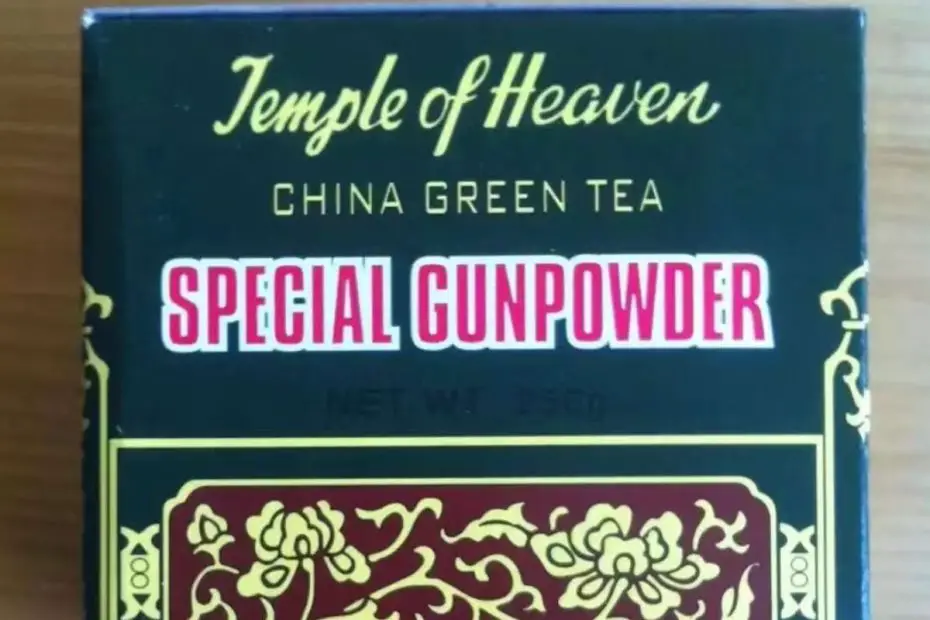Prepare to be blown away as we delve into the world of Chinese Gunpowder Tea – a tightly rolled treasure with roots tracing back to ancient China.
Its name stems from the resemblance of its leaves to gunpowder pellets, but the explosive flavor and potential health benefits are what truly set it apart.
From potential blood pressure management to a calming yet alert mind, this tea packs a punch.
So, unroll a little history, brew a cup, and let the flavor fireworks begin! 🍵💥
What is Chinese Gunpowder Tea?
Chinese Gunpowder Tea originated in China and has a rich history tracing back to the Tang Dynasty (618-907 AD). It is primarily produced in the Zhejiang province of China, particularly in regions like Pinghu, Shaoxing, and Ningbo.
The name “Gunpowder Tea” is attributed to its appearance, as the tightly rolled tea leaves resemble small pellets, akin to the grains of gunpowder used in ammunition. This visual resemblance led to the association with gunpowder, resulting in the tea’s distinctive name.
Aside from Gunpowder Tea, this variety is also known by other names such as “Zhu Cha,” which translates to “Pearl Tea” due to the pellet-like shape, and “Zhū Háo Chá” in Mandarin, which means “Pearl Fur Tea.” Some individuals colloquially refer to it as “Bullet Tea” due to the resemblance of the rolled leaves to bullets.
Gunpowder Tea has gained popularity among a diverse range of tea enthusiasts. In Morocco, it is a staple for crafting traditional mint tea, combining the tea leaves with fresh mint leaves and sugar.
Additionally, it appeals to those who appreciate green tea with a slightly smoky flavor profile. Its versatility extends to culinary applications, as chefs sometimes use it to infuse dishes with a hint of tea’s unique character.
Elevate your Gunpowder Tea experience with the ideal tea set✨ with our hand picked best Gunpowder Tea.
benefits of gunpowder green tea
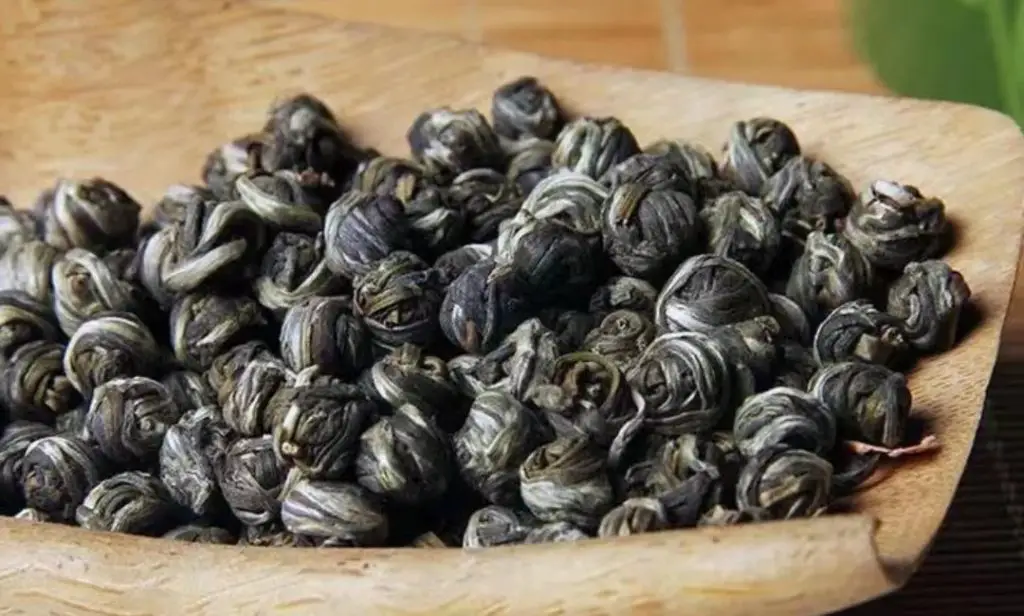
1. Gunpowder Tea for Managing Blood Pressure
Blood pressure is a measure of how forcefully your heart pumps blood around your body. It’s crucial to maintain a healthy blood pressure range to support your cardiovascular health.
Gunpowder Tea has been studied for its potential role in this area. Researchers found that the antioxidants in Gunpowder Tea, like Epigallocatechin gallate (EGCG), can help relax the blood vessels, contributing to better blood pressure levels. This can have positive implications for your heart health.
2. Gunpowder Tea and Skin Health
Your skin is the body’s largest organ, and taking care of it is essential for both appearance and well-being. Gunpowder Tea’s benefits extend to your skin too.
Studies suggest that the antioxidants in Gunpowder Tea, particularly EGCG, have anti-inflammatory properties that can help reduce swelling and redness.
Additionally, applying Gunpowder Tea topically has been shown to reduce sebum secretion, which can lead to acne. It also helps moisturize the skin, leading to smoother and healthier-looking skin.
3. Digestive Support with Gunpowder Tea
Digestive issues like bloating, cramping, and inflammation can be uncomfortable. Gunpowder Tea may offer some relief, especially for colitis, an inflammatory disorder affecting digestion.
The EGCG in Gunpowder Tea can help reduce inflammation in the digestive tract, potentially easing symptoms.
4. Mental Alertness and Relaxation
Gunpowder Tea contains a moderate amount of caffeine, which can provide an energy boost without making you feel jittery.
Moreover, it also contains theanine, an amino acid that promotes a calm and relaxed state of mind. This combination of caffeine and theanine can improve mental alertness while maintaining a sense of calm.
5. Gunpowder Tea and Weight Management
For those looking to manage their weight, Gunpowder Tea can be a helpful addition to your routine. Its low-calorie content makes it a better alternative to sugary beverages.
Moreover, the EGCG in Gunpowder Tea has been shown to boost metabolism and enhance fat burning, even during rest, which can support your weight loss efforts.
6. Gunpowder Tea and Diabetes
Gunpowder Tea might play a role in reducing the risk of type-2 diabetes. Studies have indicated that regular consumption of green tea, like Gunpowder Tea, could lower the chances of developing this type of diabetes. It may also help manage weight, which is a contributing factor to diabetes.
7. Immune System Support with Gunpowder Tea
In our modern, stressful lives, maintaining a healthy immune system is crucial. Gunpowder Tea, with its L-theanine content, can help promote a sense of calm and relaxation, reducing stress. This can have a positive impact on your overall immune system health.
8. Gunpowder Tea and Cholesterol
High levels of “bad” LDL cholesterol can contribute to heart health problems. Gunpowder Tea has been found to help lower total cholesterol, including LDL cholesterol, without affecting the “good” HDL cholesterol. This can be beneficial for maintaining a healthy heart.
Gunpowder Tea is just the beginning of China’s tea wonders! Explore the fascinating realm of Chinese Tea Cakes and enrich your tea journey.✨
Gunpowder tea side effects
- Caffeine-Related Effects: Gunpowder Tea contains caffeine, which can lead to side effects if consumed in large amounts. These effects may include jitteriness, restlessness, increased heart rate, difficulty sleeping (insomnia), and feelings of anxiety.
- Digestive Distress: Some individuals may experience gastrointestinal discomfort such as nausea, stomach upset, bloating, or diarrhea due to the caffeine content in Gunpowder Tea.
- Headaches or Migraines: Caffeine sensitivity can trigger headaches or migraines in some people. If you are prone to these issues, be cautious with your Gunpowder Tea consumption.
- Interference with Medications: The caffeine in Gunpowder Tea can interact with certain medications, affecting their effectiveness or causing unwanted reactions. If you’re taking medications, consult your healthcare provider before consuming Gunpowder Tea regularly.
What does Chinese gunpowder tea taste like?
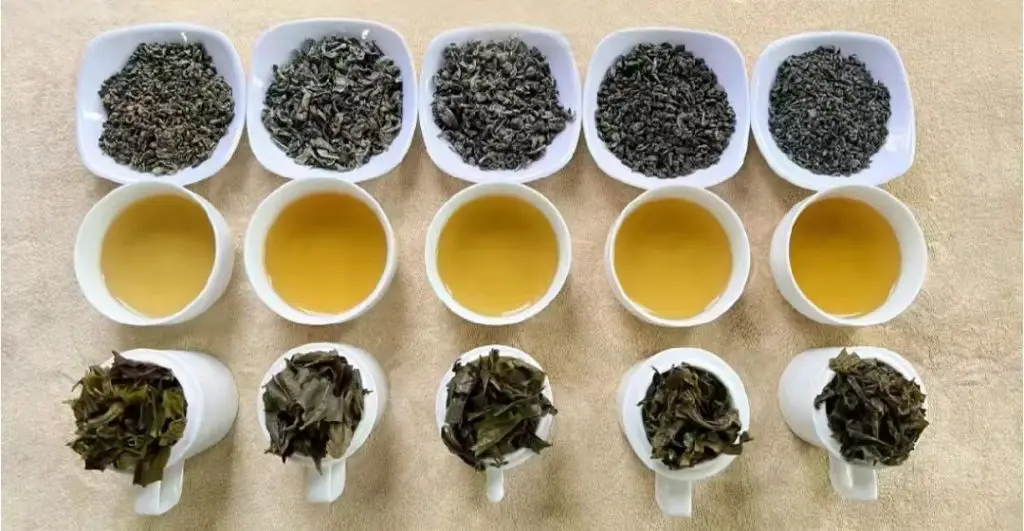
- Earthy and Smoky: Gunpowder Tea often has a slightly smoky and earthy undertone, which can evoke a sense of warmth and depth in the flavor.
- Grassy and Vegetal: The tea’s flavor is also characterized by grassy and vegetal notes, reminiscent of fresh greens. This gives the tea a clean and refreshing quality.
- Mild Astringency: Gunpowder Tea typically has a mild astringency that adds a slight tanginess to the taste. This astringency is balanced by its other flavors, contributing to a well-rounded profile.
- Mineral Notes: Some varieties of Gunpowder Tea may exhibit subtle mineral or mineral-like notes, contributing to the complexity of the taste.
- Full-Bodied: Due to the tightly rolled leaves, Gunpowder Tea often produces a full-bodied infusion that can feel satisfying and substantial on the palate.
- Smooth Finish: Despite its robust flavors, Gunpowder Tea usually finishes with a smooth and clean aftertaste.
It’s important to note that the flavor of Gunpowder Tea can vary depending on factors such as the tea’s origin, the specific processing methods used, and individual brewing techniques. As with any tea, personal taste preferences play a significant role in how you perceive its flavors.
If you enjoy teas with earthy, smoky, and vegetal characteristics, you’re likely to appreciate the unique taste of Chinese Gunpowder Tea.
How To Make Gunpowder Tea
Gather Your Supplies:
Chinese Gunpowder Tea leaves
Fresh, filtered water
Teapot or tea infuser
Teacups
Measure the Tea Leaves:
Use approximately 2 teaspoons of Gunpowder Tea leaves for every 8 ounces (about 240 ml) of water. Adjust the amount based on your taste preferences and the size of your teapot or infuser.
Preheat the Teapot:
Pour a small amount of hot water into the teapot to preheat it. Swirl the water around and then pour it out.
Boil Water:
Heat water to around 80°C (176°F). This is just below boiling point. Use a thermometer to measure the water temperature accurately.
Add Tea Leaves:
Place the measured Gunpowder Tea leaves into the preheated teapot or infuser.
Pour Water:
Slowly pour the hot water over the tea leaves. Be sure to evenly wet all the leaves to ensure proper steeping.
Cover and Steep:
Cover the teapot or infuser with a lid or cover to trap the heat and aroma. Allow the tea to steep for about 1 minute. If you’re following the package instructions, you can steep for 2-3 minutes.
Observe Unfurling:
During steeping, you’ll notice the tightly rolled leaves begin to unfurl and release their flavors.
Pour and Enjoy:
After the steeping time is complete, carefully pour the brewed Gunpowder Tea into teacups. You can use a strainer if your teapot or infuser doesn’t have one built-in.
Multiple Steeps (Optional):
Gunpowder Tea is known for its ability to be steeped multiple times. For subsequent steeps, increase the steeping time slightly (e.g., 10-15 seconds longer than the previous steep) to extract more flavor from the leaves.
Appreciate the Flavor:
Gunpowder Tea offers a unique flavor profile characterized by its earthy, slightly smoky, and vegetal notes. Take a moment to savor the aroma and taste.
Experiment and Adjust:
Feel free to experiment with the steeping time, tea-to-water ratio, and water temperature to find the perfect balance that suits your taste preferences.
Chinese gunpowder tea caffeine content
(35-40 mg/8 oz serving)
gunpowder tea vs green tea
Gunpowder tea is categorized as a type of green tea, distinguished by its rolled pellet form. However, it stands out for its amplified health benefits compared to other varieties of green tea, in addition to containing caffeine.
gunpowder green tea caffeine vs coffee
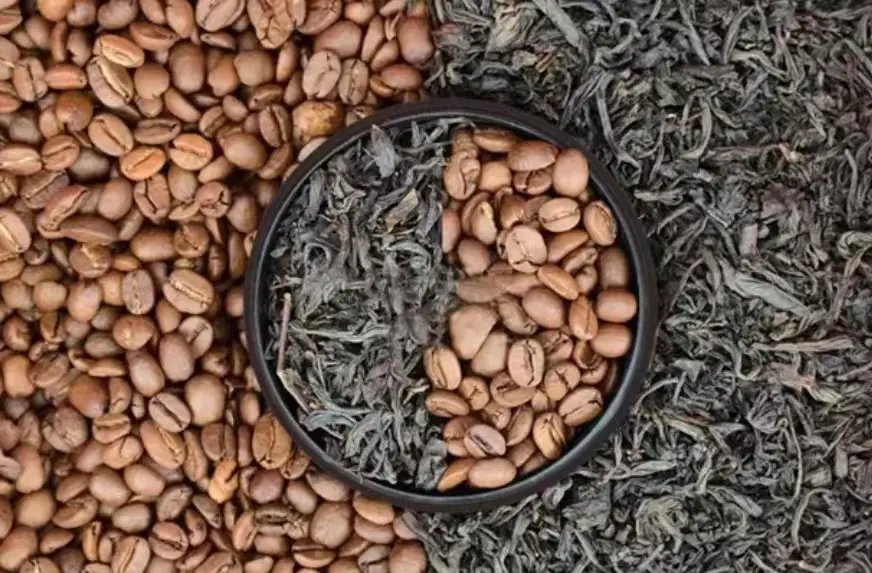
| Tea Type | Caffeine Content per Cup | Comparison to Coffee’s Caffeine Content |
|---|---|---|
| Gunpowder | About 40mg | Lower caffeine content than coffee |
| Average Cup of Coffee | 100–150mg | Higher caffeine content than tea |
gunpowder green tea vs sencha
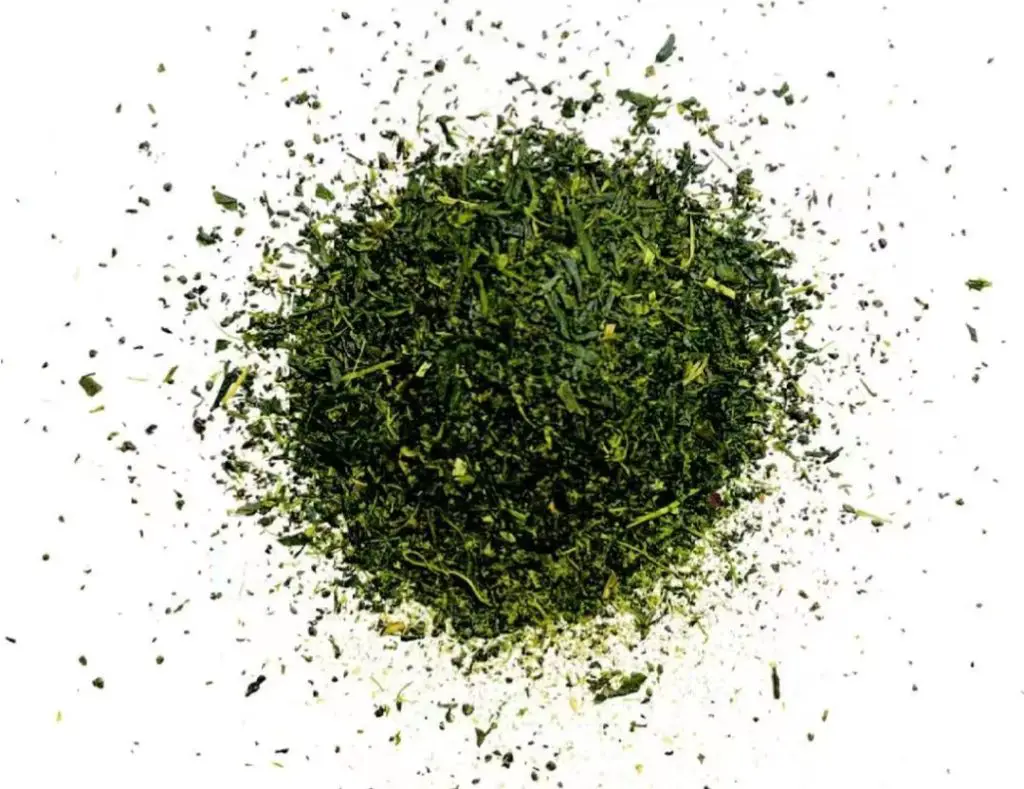
| Aspect | Gunpowder Green Tea | Sencha |
|---|---|---|
| Origin | Mainly produced in China and Taiwan | Primarily produced in Japan |
| Leaf Appearance | Rolled pellets resembling gunpowder | Flat, needle-like leaves |
| Flavor | Slightly smoky with a bold taste | Grassy, vegetal, sometimes sweet |
| Aroma | Earthy and slightly smoky | Fresh, grassy, seaweed-like |
| Caffeine Content | Moderate caffeine content | Moderate caffeine content |
| Processing Method | Leaves rolled into pellets during drying | Leaves are steamed, then rolled and dried |
| Brewing Temperature | Around 160-180°F (70-85°C) | Around 160-175°F (70-80°C) |
| Brewing Time | 2-3 minutes | 1-2 minutes |
| Health Benefits | Higher antioxidants and polyphenols than Sencha | Rich in antioxidants and catechins |
| Cultural Significance | Not as deeply rooted in traditional tea culture | Integral part of Japanese tea culture |
Is gunpowder tea the same as Matcha?
No, Gunpowder tea and Matcha are not the same. They are two distinct types of green tea with different characteristics and processing methods.
Here’s a comparison between Gunpowder tea and Matcha:
| Aspect | Gunpowder Tea | Matcha |
|---|---|---|
| Origin | China, Taiwan | Japan |
| Leaf Appearance | Rolled pellets resembling gunpowder | Fine green powder |
| Flavor | Slightly smoky, bold, earthy | Creamy, rich, umami, slightly sweet |
| Preparation | Brewed in hot water for 2-3 minutes | Whisked with hot water into a frothy mix |
| Caffeine Content | Moderate | Higher than other green teas |
| Antioxidants | Contains antioxidants | Rich in antioxidants and chlorophyll |
| Processing | Leaves rolled into pellets | Leaves shade-grown, steamed, and ground |
Summary: Gunpowder Tea and Matcha are distinct types of green tea originating from different regions. Gunpowder Tea features rolled pellets with a slightly smoky flavor, while Matcha is a powdered tea with a creamy, umami-rich taste.
Gunpowder Tea is steeped traditionally, while Matcha is whisked into a frothy mixture. Matcha contains higher caffeine content and is especially abundant in antioxidants and chlorophyll due to its unique growing and processing methods.
